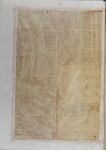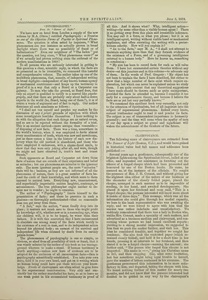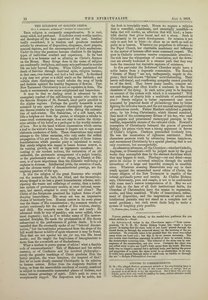Psyhography
We have now on hand from London a supply of the new volume by M.A. (Oxon.) entitled Psychography: a, Treatise on one of the Objective Forms of Psychic or Spiritual Phenomena. The question is often asked by inquirers, “What phenomenon can you instance as actually proven in broad daylight where there was no possibility of fraud or of hallucination?” Even our neighbour of “The Index” put the question, not long since, “What phenomena occur?” as if we actually had proven nothing since the outbreak of the modern manifestations in 1848!
To all persons who are seriously interested in getting to this question a clear, scientific reply, in which the facts are so presented as to be irresistible, we commend this tasteful and comprehensive volume. The author takes up one of the multiform phenomena, that, namely, of independent writing in broad daylight—independent of any known human agency or mechanical contrivance—and keeps up the testimony in proof of it in a way that only a Beard or a Carpenter can gainsay. To men who take the ground, as Beard does, that only an expert is qualified to testify to a marvel like psychography, and that there are probably only about half-a-dozen experts in the world (he, Beard, being one of them?), it is of course a waste of argument and of fact to reply. Our author dismisses all such assailants as follows:
“I shall not vex myself and perplex my readers by the discussion of any d priori grounds of rejection with which some investigators bewilder themselves. I have nothing to do with the allegation that such things are ex natura rerum, and so are to be rejected without the formality of a trial. This is an ancient method—more antique than venerable—of disposing of new facts. There was a time, somewhere in the world’s history, when it was employed to burke almost every manifestation of truth, which was new and unwelcome, just as there comes a time in the history of each new discovery when the old method is abandoned, and those who have employed it endeavour, with a shame-faced smile, to show that they were only joking after all, and were, though we might not have observed it, truth’s best and truest I friends.”
Such opponents as Beard and Carpenter set down those facts of nature that are outside of their experience and belief as miracles; but our phenomena are miracles to the ignorant only. The more ignorant people are, the more “miracles” there will be; because, as they are not informed of all the phenomena of nature, there is a great number of facts beyond the circle of their knowledge, and which seem to them opposed to natural laws. Everything new, unaccustomed, and superficially improbable excites laughter, contempt, or astonishment. The true philosopher ought neither to despise nor to wonder; he ought to examine.
The author of “Psychography” limits himself to the presentation of facts; and these he presents in such a phalanx—so thoroughly authenticated—that no reasonable man can get away from them.
“A fact,” says the author, “must finally drop into its place; it matters not much save to those who might profit by knowledge of it, whether now or in a succeeding age, when our children will, it is to be hoped, be wiser than their fathers. It is with this conviction that I have endeavoured to elucidate one among many of the facts which testify to the existence of a soul in man, and to its independent action beyond his physical body; an earnest of its survival and independent life when released by death from its earthly prison-house.”
The phenomenon of psychography is one so simple, so obvious, so aloof from all possibility of trick or fraud, that it was wisely selected by the author of this book as his vantage ground whereon to make a stand. If human testimony is worth anything—unless new laws of evidence are to be adopted for the exclusion of all inconvenient facts—then is psychography scientifically established. You take your own slate, hold it in your own hand, and get bn it writing which no human being could have put there without your knowledge. Proofs of clairvoyance are often added to give force to the supersensual manifestation. Very ably and succinctly has the author marshalled his facts, so as to leave no one weak point in his accumulated testimony in proof of all this. And it shows what? Why, intelligent action—writing—by some other than a visibly human agent! There is no getting away from this plain and irresistible inference. You may call it a force, or what you please; but it is an intelligent agent, writing without visible hand or mechanical appliance, and often executing the writing with a preterhuman celerity. How will you explain it?
“As to the facts,” says M. A., “I shall not attempt to maintain anything more than, that they furnish evidence of the existence of a Force, and of a governing intelligence external to a human body.” Here he leaves us, remarking in conclusion:
“My aim has been to record facts for such as will value them. I have but enumerated certain theories without any desire—at this juncture and in this volume—to advocate any of them. In the words of Prof. Gregory: ‘My object has not been to explain the facts I have described, but rather to show that a large number of facts exist which require explanation, but which can never be explained unless we study them. I am quite content that any theoretical suggestions I have made should be thrown aside as quite unimportant, provided the facts be attended to, because I consider it too early for a comprehensive theory, and because I believe the facts are as yet but very partially known.’”
We commend this excellent book very earnestly, not only to the attention of Spiritualists, but of all inquirers into the subject of supersensual phenomena. Indeed every brave, earnest truth seeker ought to read it and ponder its facts, The subject is one of transcendent importance to humanity generally; and the time will come when the apathy of men of our day upon a subject so grand and significant will waken the astonishment of the thinkers of the future.
Answer to Correspondents
H. M.—The alleged Eastern permanent miracle of the ever-burning lamp is so direct a violation of the law of the conservation of energy, that no physicist is at all likely to try the experiment. But if those who give the details, prove their own words by making the lamp, serious attention would willingly be given to the subject.
Editor's notes
Sources
-
London Spiritualist, No. 306, July 5, 1878, p. 4
-
London Spiritualist, No. 306, July 5, 1878, p. 12



